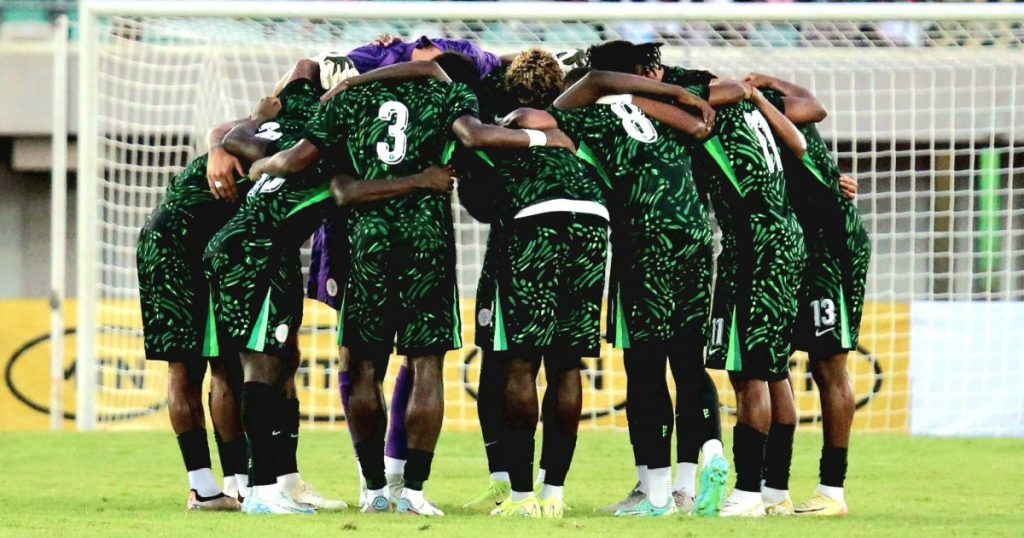The Nigerian Super Eagles’ 1-1 draw against Zimbabwe in a crucial World Cup qualifier ignited a firestorm of criticism from fans across the nation. The match, played at the Godswill Akpabio Stadium in Uyo, exposed familiar flaws within the team, leaving supporters questioning the squad’s composition, tactical approach, and overall commitment. A recurring theme was the glaring disconnect between individual brilliance and cohesive team play. Many fans lamented the squandering of Victor Osimhen’s tireless efforts, highlighting the lack of support from midfield and defensive players who seemingly failed to capitalize on the opportunities created. The sentiment was that Osimhen, a shining beacon of individual talent, was carrying the weight of the team on his shoulders, only to be let down by the lackluster performances of his teammates. This perceived over-reliance on individual brilliance rather than structured teamwork sparked calls for a radical overhaul of the squad, urging the coach to inject fresh blood and build a more cohesive unit capable of consistent performance.
The fans’ frustration extended beyond the midfield and defense, reaching the attack as well. Despite creating chances, the Super Eagles displayed a lack of clinical finishing, failing to convert opportunities into goals. This profligacy in front of goal further compounded the disappointment of a home draw, a result that significantly dented Nigeria’s hopes of qualifying for the World Cup. The inability to capitalize on home advantage was a recurring theme in the fans’ reactions, with many expressing a sense of déjà vu, lamenting another instance where dreams were shattered on home soil. The overall sentiment reflected a deep-seated concern about the team’s inability to perform consistently, especially in crucial matches where victory is paramount. This inconsistency was highlighted by their recent record, having secured only one win in their last six matches – a stark contrast to the expectations surrounding a team of Nigeria’s stature.
Central to the fan criticism was the perceived lack of urgency and commitment from several players. Many questioned whether the players were replicating the same level of intensity and dedication they displayed for their respective clubs. This perceived disparity in effort fueled speculation that some players lacked the necessary passion and understanding of what it meant to represent the nation. The lack of hunger and desire to win, as observed by many fans, was particularly disheartening, especially in a crucial qualifier match with so much at stake. The absence of this fighting spirit further exacerbated the sense of disappointment and frustration among the supporters, who yearned for a team that played with heart and soul.
In addition to general concerns about commitment and effort, specific players were singled out for criticism. William Troost-Ekong, a long-standing figure in the Super Eagles’ defense, bore the brunt of much of the negative feedback, with some fans even calling for his retirement from international football. Similarly, Wilfred Ndidi’s place in the starting lineup was questioned, with suggestions that Frank Onyeka offered a superior alternative in midfield. These targeted criticisms highlighted the growing dissatisfaction with certain players’ performances and fueled demands for changes in personnel and team selection. The fans’ calls for change extended beyond individual players to the overall tactical approach of the team.
The clamor for change resonated throughout the fan base, with many advocating for the integration of new players and a shift in tactical strategy. Ola Aina and Calvin Bassey were identified as potential solutions at the full-back positions, while others suggested that Ahmed Musa, Samuel Kalu, Alex Iwobi, and Wilfred Ndidi should no longer be automatic starters. These suggestions reflected a growing belief among fans that the current squad composition and tactical approach were not yielding the desired results. The calls for change extended beyond individual players to encompass a broader desire for a more dynamic and effective playing style that would maximize the team’s potential.
The overall picture painted by the fans’ reactions was one of profound disappointment and mounting concern for the future of the Super Eagles. The draw against Zimbabwe was not merely a setback in the World Cup qualifying campaign; it was a symptom of deeper issues plaguing the team. The perceived lack of cohesion, the over-reliance on individual brilliance, the inconsistent performances, and the questionable commitment of certain players all contributed to a sense of unease among the supporters. The fans’ impassioned pleas for change, for a renewed sense of purpose, and for a team that truly represents the nation’s footballing aspirations, echoed across social media and beyond, signaling a critical juncture for Nigerian football. The challenge for the Super Eagles now is to address these concerns and rebuild the trust of their disillusioned fan base.


